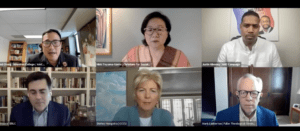 It is through labor that we, as humans, make the world. In doing so, we make ourselves. We make reality. In this way, to solely commodify your labor and sell it in service of profit and capitalist competition can alienate you from your labor, and thus from yourself. You are no longer co-creating the world; you are no longer involved in the development of human history. Thus you are dehumanized, unmade and ultimately unfulfilled.
It is through labor that we, as humans, make the world. In doing so, we make ourselves. We make reality. In this way, to solely commodify your labor and sell it in service of profit and capitalist competition can alienate you from your labor, and thus from yourself. You are no longer co-creating the world; you are no longer involved in the development of human history. Thus you are dehumanized, unmade and ultimately unfulfilled.
It wasn’t so much that Karl Marx woke up one morning and said, “Capitalism is bad. We should do something different.” Nor did his critiques lay entirely upon the unjust and unfair outcomes of capitalism in practice. Instead, Marx’s criticisms were pointed towards what he discovered churning away in the intestines of this enormously powerful and productive system: contradictions and assumptions that gave rise to widespread dehumanization and alienation. However, this was seen not as an unexpected phenomenon but as the logical consequence of the machine itself.
But even this critique is incomplete, because there is more to our labor than we find in a strictly materialist concept of the world. Marx was right to see labor as an intrinsic part of the human person, a part that is critical to being human. But like many, he was content to stop short of exploring any question regarding why our labor power really exists in the first place or whether or not it has a willed, created purpose.
Like others in history, Marx recognized labor—by which we mean simply mankind’s ability to manipulate the material world—as a central component to humanity and that which makes us human. But as people of faith we must go further. We must go beyond Marx, his contemporaries, and all those who came after. We must dig at the root of why we labor until we arrive at the feet of God. It is here that we find an even greater purpose for our labor and thus a greater problem in its misuse and degradation.
The human fulfilled
I am a member of the Christian faith—more specifically the Catholic Church—so it is not radical for me to state my belief that true human fulfillment, the scratching of the all too common itch that drives us to find purpose and meaning in our lives, is found in the person of Jesus Christ, the Son of the Living God. What we are, what we are meant to be, what we have the potential to be, how we can be it—all of this is found in the Gospel message, in the model of Christ himself, and nowhere is it communicated in a more direct and distilled manner than in the Gospel of Matthew:
When the Pharisees heard that he had silenced the Sadducees, they gathered together, and one of them [a scholar of the law] tested him by asking, “Teacher, which commandment in the law is the greatest?” He said to him, “You shall love the Lord, your God, with all your heart, with all your soul, and with all your mind. This is the greatest and the first commandment. The second is like it:* You shall love your neighbor as yourself. The whole law and the prophets depend on these two commandments (Matthew 22:34-40).
In these words, Christ communicates mankind’s central mandate, one that expresses our very purpose as humans: love God and love your neighbor. However, practical questions naturally arise here, such as, “How do I love God? How do I love my neighbor? Better yet, how do I love in general?” These are good, correct questions to ask. How does one actually love God, who we cannot perceive with our senses? How does one love the neighbor, especially if we do not know them, or worse, like them? What are we actually to do?
These questions ought to show us that Christ’s command is more than to order our thoughts and feelings towards something or someone. It is not a purely metaphysical or emotional labor. It is one that requires action—action in service to one another. To labor for the good of the other is one of the earliest signs of love in the Scriptures, and it is at the root of civilization as we know it. Let us also consider the greatest act of love: creation itself. Existence is because God willed it out of pure love. God was not content to love without action, and neither should we. Moreover, Christ’s teachings show us that the heart of Christian life is, in fact, action.
What made the Good Samaritan good? His heart, of course, but more centrally it was his actions in helping the beaten and robbed man. Furthermore, Christ directly tells us how to love our neighbor; it is through healing, sheltering, clothing, feeding, giving drink, instructing, and comforting. It is by working to serve our fellow humans, by living in service, that we show our love for our neighbor. Thus, by fulfilling the second greatest commandment, we also fulfill the first. “‘Lord, when did we see you hungry and feed you, or thirsty and give you drink? When did we see you a stranger and welcome you, or naked and clothe you? When did we see you ill or in prison, and visit you?’ And the king will say to them in reply, ‘Amen, I say to you, whatever you did for one of these least brothers of mine, you did for me” (Matthew 25:37-40).
This is the model for life, for ultimate human fulfillment. A life lived in love for God and God’s creation. We are told in the First letter of John that we cannot claim to love God if we do not love our fellow humans. And this love, as we have shown, is rooted in action towards one another. Therefore, we are brought back to the original question regarding the essential nature of labor, since action is not possible without it.
Labor as a holy gift
Are we to believe it is a simple coincidence that the necessary tools to live a life of love in action already exist inside us? Not just the ability to labor in the world, but to know it, understand it, and put meaning to it? I think not. If we believe in a God that willed existence, that designed all things to be fulfilled in God, then there is no difficulty in recognizing purpose in God’s creation.
Labor is not an accidental development arising from millions of years of evolution. It is something specially crafted and given to humanity with intent. It is an intrinsic part of us. It is ordered towards the fulfillment of Christ’s commandments and thus human fulfillment. Labor is something “set apart.” It is holy. And as with all holy things, our desire should be to use it for that which it was designed, and not for our own created purposes.
If human fulfillment is found in Christ, then all things that are not of Christ are ultimately dehumanizing. When we use holy things against their intended purposes, we degrade or desecrate that thing. If our labor is a holy and inextricable part of our being, then to put its use towards that which does not fulfill us in Christ is to dehumanize ourselves. When labor is boxed up and sold to be used in the exploitation of our environment, when its primary function is to generate profit, when it is ordered towards creation simply for consumption, when it is forced into a competition, when it is used to create or distribute that which is harmful to life itself, then its holy nature is degraded and we find it all the more difficult to understand our essential human dignity in Christ.
These sinister situations are, unfortunately, completely intertwined in the machinations of our capitalist and consumerist society. Marx saw this plainly: the capitalist system relies on the exploitation of labor—its sale and purchase, its control by another, its use towards that which drives profit. Beyond Marx’s limited view, however, we have collectively taken that which was meant to glorify God and used it to erect great structures of sin that envelop our society and lock the average human into a dehumanizing, unholy cycle from which escape is virtually impossible. However, how to address this in a practical manner is the subject of another essay, or perhaps many.
It is worth noting that the Social Doctrine of the Catholic Church has maintained that “work is for man, not man for work.” In all productive situations, the worker is always more important than the work. The dignity of the worker stands above profit and gains. Compensation and remuneration should always be sufficient to live and support a family. The human person is God’s image bearer, not simply an “employee,” and the essential purpose of our labor should not be lost in pursuit of the dollar.
 Matthew Tyson is an educator and writer from Alabama, where he lives with his wife and four children. Topics of interest include labor, Catholic education, catechesis, and literature.
Matthew Tyson is an educator and writer from Alabama, where he lives with his wife and four children. Topics of interest include labor, Catholic education, catechesis, and literature.


